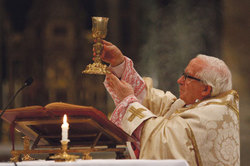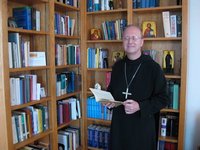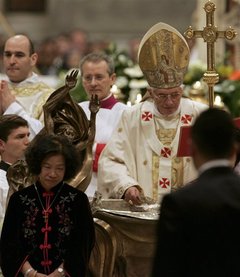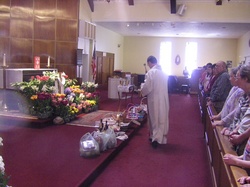The Holy Father addressed Vox Clara during a lunch meeting, and approved the new translation of the 2002 Roman Missal. This is tremendous news. I look forward to praying the new texts! Not a perfect text but one that's more theologically correct than the current missal. Some work still needs to be done but that ought to be finished shortly so that publishers, musicians, priests, and laity can make the new texts available for the anticipated inauguration for the First Sunday of Advent 2011. Each of the 11 English speaking conferences of bishops will get to work on rolling out the new missal in their countries with the proper catechetical formation for clergy and laity alike. The Pope's words today:
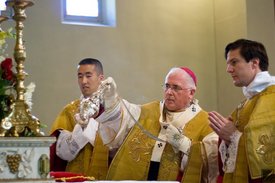
I thank you for the work that Vox Clara has done over the last eight years, assisting and advising the Congregation for Divine Worship and the Discipline of the Sacraments in fulfilling its responsibilities with regard to the English translations of liturgical texts. This has been a truly collegial enterprise. Not only are all five continents represented in the membership of the Committee, but you have been assiduous in drawing together contributions from Bishops' Conferences in English-speaking territories all over the world. I thank you for the great labour you have expended in your study of the translations and in processing the results of the many consultations that have been conducted. I thank the expert assistants for offering the fruits of their scholarship in order to render a service to the universal Church. And I thank the Superiors and Officials of the Congregation for their daily, painstaking work of overseeing the preparation and translation of texts that proclaim the truth of our redemption in Christ, the Incarnate Word of God.
Saint Augustine spoke beautifully of the relation between John the Baptist, the vox clara that resounded on the banks of the Jordan, and the Word that he spoke. A voice, he said, serves to share with the listener the message that is already in the speaker's heart. Once the word has been spoken, it is present in the hearts of both, and so the voice, its task having been completed, can fade away (cf. Sermon 293). I welcome the news that the English translation of the Roman Missal will soon be ready for publication, so that the texts you have worked so hard to prepare may be proclaimed in the liturgy that is celebrated across the anglophone world. Through these sacred texts and the actions that accompany them, Christ will be made present and active in the midst of his people. The voice that helped bring these words to birth will have completed its task.
A new task will then present itself, one which falls outside the direct competence of Vox Clara, but which in one way or another will involve all of you - the task of preparing for the reception of the new translation by clergy and lay faithful. Many will find it hard to adjust to unfamiliar texts after nearly forty years of continuous use of the previous translation. The change will need to be introduced with due sensitivity, and the opportunity for catechesis that it presents will need to be firmly grasped. I pray that in this way any risk of confusion or bewilderment will be averted, and the change will serve instead as a springboard for a renewal and a deepening of Eucharistic devotion all over the English-speaking world.
Dear Brother Bishops, Reverend
Fathers, Friends, I want you to know how much I appreciate the great
collaborative endeavour to which you have contributed. Soon the fruits of your
labours will be made available to English-speaking congregations everywhere. As
the prayers of God's people rise before him like incense (cf. Psalm 140:2), may
the Lord's blessing come down upon all who have contributed their time and
expertise to crafting the texts in which those prayers are expressed. Thank
you, and may you be abundantly rewarded for your generous service to God's
people.
